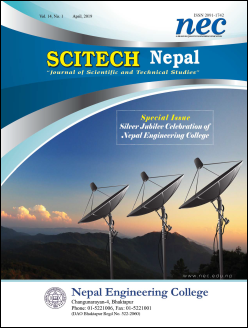Socioeconomic Impacts of FMIS after Rehabilitation: Case Study of Bakultar Irrigation Project, Mahadevsthan, Dhading
DOI:
https://doi.org/10.3126/scitech.v14i1.25531Keywords:
FMIS, Rehabilitation, Socioeconomic impacts, Agriculture, irrigationAbstract
The main purpose of the study is to focus on the socioeconomic impacts of rehabilitation of Bakultar Irrigation Project in the Mahadevsthan, Dhading district, Nepal. Primary information was collected through household survey, Key Informant Interview, and FGD. Both qualitative and quantitative techniques were used for data analysis. The rehabilitation intervention of the irrigation project has changed the cropping pattern and increased the crop productivity. The cropping intensity has increased to 244.6 % from174 %. The study shows that rehabilitation of irrigation project has positive impact over poverty reduction, food sufficiency, gender equity, migration control and reduction of women’s drudgery in household works.




